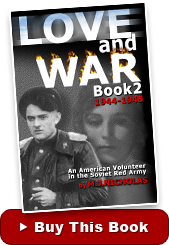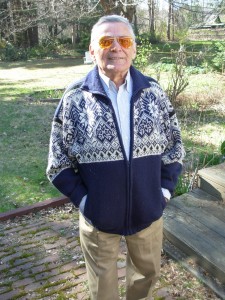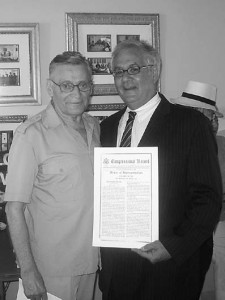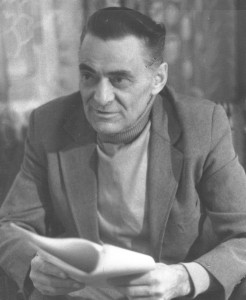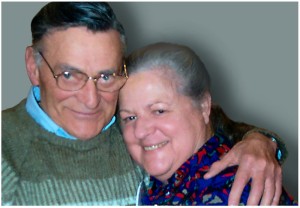By M. J. Nicholas
THE NEW YEAR 1944 BEGAN on the front lines with a party. The tank corps to which Nicholas belonged were celebrating the Soviet Red Army’s breaking the chain of Nazi occupation from the Ukraine.
THEY WERE ABOUT TO ENTER Belorussia to push the German armies out. Then would come Poland and Germany itself, where the Red Army would smash the Nazis for good. Surely in the year ahead the Western Allies would at last open the “Second Front” in France. The evil Nazi regime would be snuffed out and the war would be over.
BUT FIRST, they celebrated.
BY THE TIME this part of his story began, Nicholas was a commander of a Soviet T34/85 tank at the First Belorussian Front, under the command of Marshal Konstantin Konstantinovich Rokossovsky. He was 19 years old.
WHEN NICHOLAS WAS DECLARED FIT to return to combat, his beloved ‘Princess’ Oksana, a Red Army nurse, finagled a way to remain close to his front line position. She set up a first aid station in an evacuated khata (a peasant cottage). There they were able to carve out considerable time together week by week, sharing their stories, hopes and dreams. They loved and laughed and began to think of a life together after the war, even as the tank corps waited in reserve for the summer offensive.
IN THE MONTHS that followed, Nicholas came to value more and more the trust and friendship of his Platoon Commander, Senior Lieutenant Oleg Milyushev, a native of Odessa, on the Black Sea. During April, many in their company were looking for news from Odessa, as the Red Army’s 3rd Ukrainian Front closed in to liberate the city from enemy occupation. Milyushev was the first to receive a letter. But the letter told only of savage treatment and gruesome deaths at the hands of the Nazis and of an upsurge of hatred and rage to kill every German. Nicholas was aghast at the idea, but had to admit the thirst for revenge was a familiar attitude among his fellow soldiers, especially ones who had families in the occupied territories.
IN JUNE, Nicholas was asked by his company commander, Major Zhikharev, to listen to a confiscated short-wave radio for broadcasts in English, and to translate them. In this way Nicholas learned about the long-anticipated Second Front opening in Normandy; he heard the voices of Roosevelt, Churchill, and Eisenhower and he heard the fresh news of D-Day. The hours spent in Maj. Zhikharev’s tent, listening to radio transmissions strengthened the bonds between the two. Nicholas came to feel that Maj. Zhikharev was a second father to him.
NICHOLAS ALSO HELD a deep respect for Professor Petrovski, a Lieutenant Colonel who served as political deputy to their brigade commander. Petrovski came to their reconnaissance company from time to time to talk about historical perspectives and the international political situation. Nicholas found Petrovski smart, educated, informed and clear in his lectures and tried to write down in his little notebook everything the professor said. This habit of writing into a notebook during soldiers’ meetings would later get Nicholas into some trouble with Maj. Zhikharev, although Zhikharev’s intervention probably saved Nicholas from worse scrutiny by SMERSh.
OPERATION BAGRATION, summer of 1944, was the Red Army’s massive offensive that shoved the German armies 600 kilometers west to the Vistula River and the Polish capital of Warsaw. At Bobruysk, near Minsk, Belorussia, Nicholas’s tank company was fully engaged in a ferocious battle. Tragedy of the utmost kind struck him and Nicholas, crazed with grief, nearly destroyed himself and his tank crew with his wild behavior until they stopped him.
ONCE THEY ENTERED POLISH territory, they encountered two Nazi death camps. First was Maly Trostinets where skulls and bones littered the ground. Farther into Poland, Majdanek-Tatarski was operating and still smoldering up to the morning their tanks arrived. They were stupefied by what they found – ragged starving prisoners, Zyklon B killing rooms, cremation ovens, grisly mounds of bodies, bones and human ashes, and other horrors.
IN POMERANIA, they freed Allied pilots from a German POW camp and rescued a downed American Mustang pilot, Captain Richard O’Brian. Nicholas and Richard became friends as they discovered surprising things in common.
AFTER RECOVERING from his fourth war wound, Nicholas was transferred to the intelligence department of the 2nd Guards Tank Army, with which he remained for the rest of the war. His job was to translate foreign radio broadcasts into Russian; in this way he kept abreast of the whole, broader picture of the war action.
ON THE VERY LAST DAYS of the war, when the German capital was “cocooned” (encircled) by Soviet armies, Nicholas was part of a reconnaissance team that ‘tiger-crawled’ through Tiergarten Park in Berlin to the Reich Chancellery garden, the entrance to Hitler’s special bunker. Armed with a crude map drawn by the boy Gunther, a captured “Hitler Youth”, and with both the German and Soviet armies firing cannon and rockets over their heads, the small group entered the garden and found the burnt remains of some Nazi “big fish.” Could it have been Hitler? Was it Goebbels?
CHASED AWAY from their “findings” by a high-ranking SMERSh unit, they followed the sounds of cheering to the Reichstag, now in the hands of the Soviet Red Army. There, among thousands of rejoicing Red Army soldiers, Nicholas hoped to be reunited with his comrades-in-arms and his mentor, Maj. Zhikharev.

